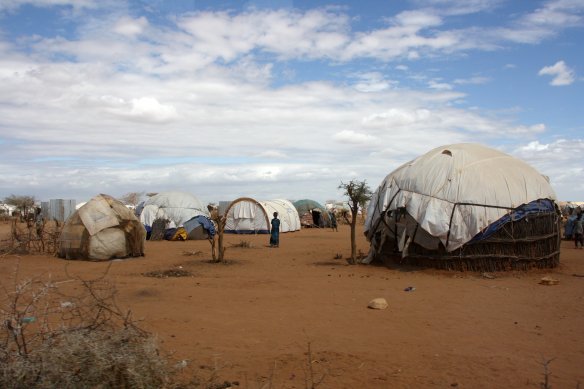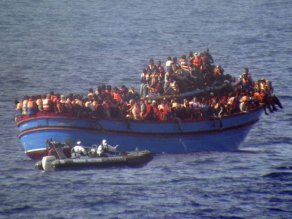Should the EU cooperate with regional states to manage and control migration from the Horn of Africa?
Proponents of greater migration control within the EU increasingly favor the use of political and economic incentives as an approach to prevent migration from the Horn of Africa and elsewhere, effectively through increasingly externalizing border control. While the unfolding humanitarian disaster in the Mediterranean shows the urgency of finding creative solutions, we argue that the solution does not lie in cooperating with states that create refugees or cannot guarantee to uphold the non-refoulement principle that EU countries have signed up for in the 1951 Refugee Convention.

Refugee shelters in the Somali refugee camp Dadaab in Northern Kenya.
The ‘Khartoum Process’
The EU-Horn of Africa Migration Route Initiative, also known as the ‘Khartoum Process’, was adopted and formally launched in Rome, Italy on 28 November 2014. It claims to build on the positive outcome of the AU regional conference on human smuggling and trafficking in the Horn of Africa and its ministerial meeting, held in Khartoum 13-16 October 2014. Participants included representatives of countries within the Horn of Africa, the EU, the AU, and observers Norway and Switzerland.
The initiative aims to tackle trafficking and smuggling from the Horn of Africa into Europe by giving regional countries far greater resources and a certain ‘political green light’ to manage and control migration. Yet the Horn of Africa states in question are both major producers of migrants and asylum seekers, as well as countries of transit for migrants and asylum seekers.
Unlikely partners
It is essential to harness political will towards the goal of addressing root causes of the various forms of migration in the Horn. It is also important to provide countries in the region with the capabilities and resources to establish transit centers for migrants on the move. Yet in the process of finding solutions, protecting the rights of refugees should remain a central aim.
Governments like Eritrea, Somalia, Ethiopia, South Sudan and Sudan – all participants of the Khartoum Process – have policies and political systems that directly render them responsible for creating conditions that produce asylum seekers. Furthermore, countries like Kenya show an increasing unwillingness and inability to provide protection to the refugees they host.
Through the Khartoum Process, EU states have entered in dialogues with Eritrea, which has dismal records of human rights and sees thousands of its citizens leave each month despite having introduced severe punishments for those who leave without permission. EU states negotiate with Eritrea to secure a number of guarantees in order to facilitate the return rejected asylum seekers in the future. These include guarantees against torture and indefinite detention as punishments for leaving the country.

Eritrean migrants crossing into Italian waters.
However, it would be near impossible to monitor the protection and safety of any returned Eritrean asylum seekers. Eritrea remains largely closed to the international community and no human rights monitoring bodies are allowed into the country. Meanwhile, the Khartoum Process emboldens Eritrea to maintain an even tighter grip on migration, and places Eritrean asylum seekers in the EU under a threat of refoulement.
An unwelcome trend
The Khartoum Process suggests the EU’s imperative to carry out migration control far away from its territories. EU states have signed a range of treaties and declarations that require them to uphold high standards of human rights. They are also obliged to treat asylum seekers in accordance with national, EU and international laws.
By giving Horn of Africa countries far greater resources and responsibility to manage and control migration, EU countries evade the pressures they face as liberal states and move them on to the same countries refugees attempt to flee from. The increasingly assertive and preemptive approaches to managing migrants much closer to source countries of origin illustrates a new trend guiding European states’ responses to asylum and migration. As we have argued here, this is a very unwelcome trend for the refugees that are among those crossing the Mediterranean, whose main aim it is to find protection from persecution and violent conflict in the Horn of Africa.